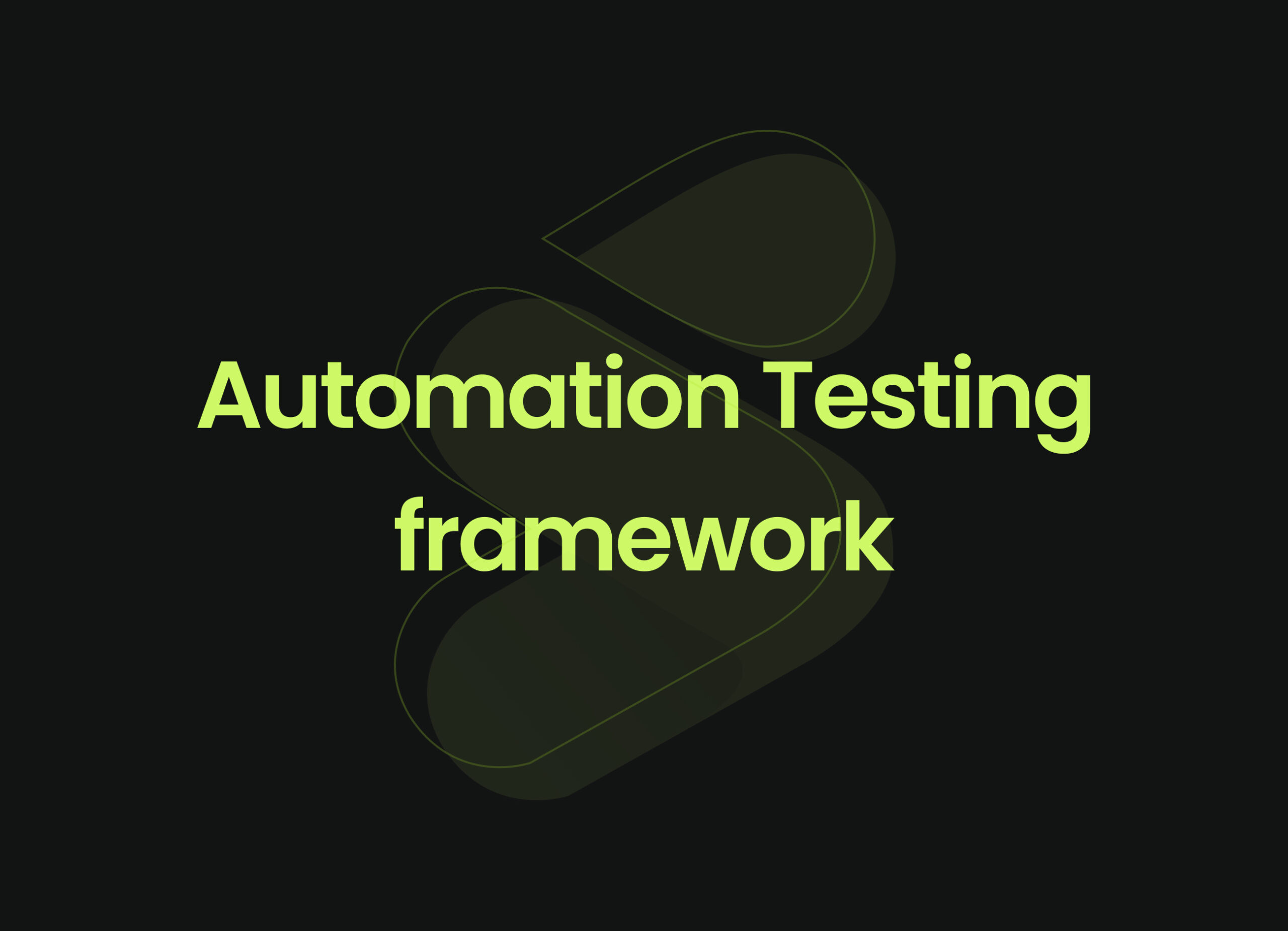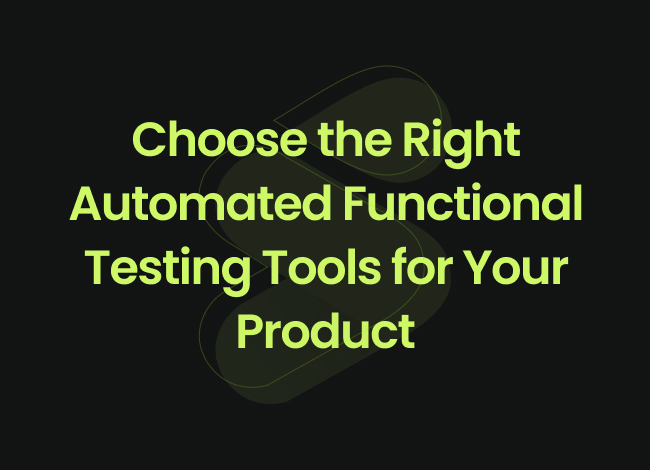Introduction
Whether you are developing software, application, or website, it must undergo testing before it is released in the market and is provided to the final users. These tests are executed to ensure that the digital product is error-free and meets the requirements of end users. These tests are conducted with the help of test automation frameworks to ensure that these tests have been conducted properly and to their full potential. But what are these frameworks of automation testing? Why are they used? And Which is the best test automation framework for web applications in 2023?
In this article, we will study the end-to-end automation testing frameworks, their types, and their purpose of usage. So let’s stick together to learn something novel and useful.
What is an Automation Testing Framework?
Test automation frameworks are the set of rules on which test cases are designed. These frameworks are a sort of guidelines and instructions that consist of tools and procedures that help the QA specialists to create test cases and then conduct them more efficiently and productively.
Example:
Let’s understand this concept with a layman’s example. Consider that you are a chef and you are making a dish. To make the dish faster and with perfection, you are supposed to follow an authentic recipe that would not only aid you in creating it but would guide you about every step of how you can create that dish. Compared to this scenario, you are a QA tester who is creating the dish or web application, the dish you are creating is a web application and the recipe you are following to create this tasty dish is the testing framework.
Why Automation Testing Frameworks Are Important?
Testing automation frameworks play a major role in the testing of web applications, software, or websites. These automation frameworks help to create test scripts that are usable and can be used on various builds to test them. These frameworks allow the tester to reuse the code in multiple scenarios and create standardized test scripts. These frameworks of automation testing, not only improve the quality of his applications and software but can conduct the tests without any waste of time or money. Besides this, these frameworks provide many other benefits:
- Reduction of Manual Interference
The framework of automation testing reduces human interference in the test. Whenever human intervention is involved in testing, there are chances of some parts remaining untested or the bug would still be there. These tests are automated and do not require much human intervention in their performance. As a result, these test automation frameworks make the testing process more authentic and reliable.
- Creation of Reusable Code
These test frameworks help to create code that is versatile and can be used in various builds. These reusable codes are standardized and can be used multiple times in different scenarios. The ability to reuse a code in several scenarios makes the testing procedure a lot easier and quicker because you won’t have to create new test codes from scratch.
- Maximum Test Coverage
Frameworks of automation testing aid in increasing our strength of test coverage. With the help of these frameworks, the testers can conduct thorough research to look for bugs and problematic areas to improve the quality of the web applications and software. These frameworks identify the key areas where it is more likely to find the bugs and then simulate real scenarios to conduct tests and improve quality.
- Better Test Efficiency
Frameworks automation testing are very efficient in saving you from the hassle of conducting all the tests manually which is time-consuming. These testing frameworks By automating repetitive and time-consuming testing tasks, they accelerate the testing phase while maintaining accuracy and consistency. These frameworks enable tests to be executed across different scenarios and configurations, ensuring thorough coverage without human intervention.
- Maintenance Cost Reduction
Testing automation frameworks offer a notable advantage of reducing maintenance costs in software development. Test scripts may be reused and executed repeatedly after they have been set up without requiring a lot of manual work. This reduces the amount of reword required to set up new tests whenever a new change has been introduced in the web application, which over time lowers maintenance expenses.
Types of Automation Testing Frameworks
Multiple types of frameworks for automation testing are widely used to optimize software and application development processes. All of these frameworks are unique in their designs, advantages, and drawbacks. The following are the most famous ones among all of the frameworks:
- Linear Automation Testing Framework
This UI automation framework is also known as Linear Scripting Framework. In this testing framework, a sequential and linear approach is carried out to design and create test scripts. It is one of the simplest frameworks of automation testing in which each test case is considered as a step that is executed in a defined manner.
- Modular-Driven Automation Testing Framework
Modular-driven automation testing framework is the latest framework of automation testing approach in which test scripts are organized into different modules and components depending upon the functionalities and features of the web application or software being tested. Every module is a set of test cases that focus on specific functions of the application. This framework aims to enhance reusability, maintainability, and efficiency in the automation testing process.
- Data-Driven Automation Testing Framework
This is a very interesting type of framework for automation testing. In this framework, test data and test scripts are kept separate. Keeping both test data and test scripts separate gives the benefit of applying test cases with multiple sets of data which not only increase the efficiency of test cases but also provide different input variations, which saves from the hassle of creating separate test scripts for each scenario.
- Keyword-Driven Testing Framework
Keyword-driven testing framework is related to the data-driven testing framework. In this testing framework, data is extracted from an external source, and the codes, which are also known as keywords, are retained to create test scripts and can draw multiple conclusions from the testing frameworks. These keywords are very important because they determine which tasks each program will perform.
- Hybrid Testing Framework
The hybrid testing framework is one of the most extensive frameworks. In this framework, any of the above two frameworks are combined to create test scripts. This combination of two different frameworks increases the strength of each approach to create a powerful and flexible testing solution. In the UI automation framework, two combined frameworks support each other to increase the overall functionality of its tests.
How Automation Testing Frameworks Aid Us
The latest framework of automation testing is in demand by testers due to its multiple benefits. It not only reduces the efforts and the overall testing period, but it also offers several other benefits:
- Better resource optimization
- Reduces human dependency
- Provides parallel testing benefit
- More accurate results due to low human intervention
- Saves overall testing time and money
Most Popular Automation Testing Tools
There are a lot of frameworks of automation testing that are used through these tools globally to create test cases and scripts but only a few of them are trustworthy and reliable. Out of all these robust automation testing framework tools following are the most important ones:
- Selenium
- Cypress
- Playwright
- WebdriverIO
- Appium
Conclusion
Frameworks of automation testing are the new hot topic and are highly in demand nowadays due to their enormous benefits like cost reduction, faster release cycle, reusable test scripts, and many more. For automation testing, the best test automation framework is the linear framework and the best-considered automation testing framework tool for it is Cypress. If you still have any confusions or questions to ask, feel free to contact Siznam and book your free consultation appointment.
People Also Ask
An automation framework is a set of rules and instructions that help to create test scripts and to execute them with perfection. The framework of automation testing is a structured set of guidelines, practices, tools, and libraries that facilitates the automation of software testing processes.
When selecting a UI automation framework for testing, many things are considered to select the best framework of automation testing tools to make the testing process more effective. There are many aspects that a tester must observe before selecting a testing framework such as:
- Testing Requirements
- Application Type
- Test Coverage
- Ease of Use
- Programming Language
- Community Support
- Cost
- Future Compatibility
There are several programming languages available that are used with automation testing frameworks to make them more effective and productive. The selection of the programming language depends upon many factors including the framework in use, specific testing tools, and many others. Depending upon these factors, the most commonly used programming languages are:
- Javascript
- Python
- C#
- Java cv
- Typescript
Although all the above-mentioned models are considered the best test automation frameworks and all of them are used by Siznam in our testing procedures, the best one that we prefer the most is the linear automation testing framework. It is considered the best due to its following benefits:
- It is quite simple
- Highly flexible
- High execution speed
Yes, these frameworks are quite cost-effective. These frameworks save our costs in the following ways:
- Reducing manual efforts
- Using reusable test scripts
- Early issue identification
- Shorter release cycle
- Lower hardware cost






